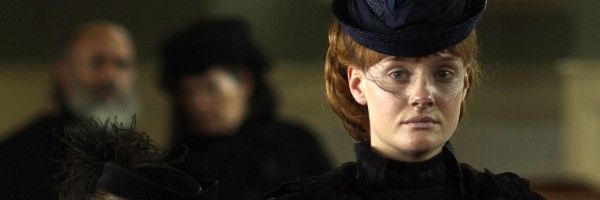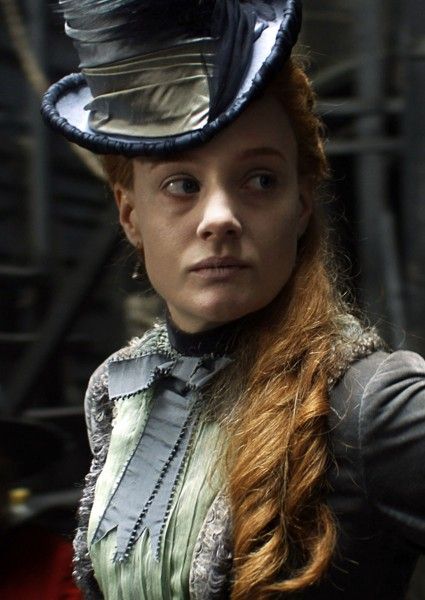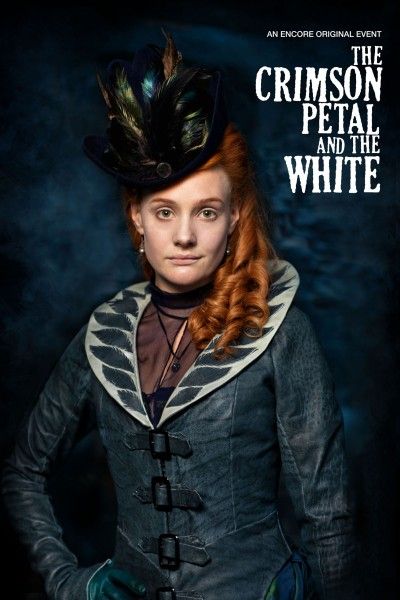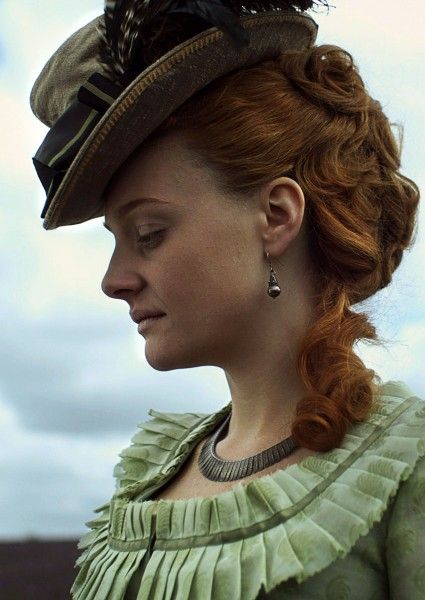Set in Victorian London, the four-part drama The Crimson Petal and The White, adapted from the book by Michel Faber, is a tale of seduction, power and class conflict centered around a vibrant, intelligent and sexually adept prostitute, named Sugar (Romola Garai). When Sugar meets wealthy businessman William Rackham (Chris O’Dowd), he is intrigued by everything she brings to his dreary existence, but as their relationship grows deeper, it also becomes more dangerous.
During this recent exclusive interview with Collider, actress Romola Garai talked about her attraction to such an extraordinary character, how desperate she was to play this role, how important it was to get all of the little details right, how difficult the sex scenes were, and working with co-star Chris O’Dowd. She also talked about what fans can expect from Season 2 of her BBC drama series The Hour, what it was like to do the sci-fi film Last Days on Mars, and what she looks for in a role. Check out what she had to say after the jump.
Collider: How did this come about for you? Was it a role you were approached about doing?
ROMOLA GARAI: God, no! I auditioned for it and I had a lot of meetings. I don’t think I was the director’s vision for the part, at all. I don’t look anything like she’s supposed to look, and the visual is so important. She’s describe in so much detail in the book, with her hair, her body and her skin, and everything. So, I got the script and read it, and I had read the novel. I was like, “I really want this job!” I went in about four times and just tried to be really flexible and do it different ways and try to work out what (director) Marc [Munden] wanted. That’s how I got it.
What was it about Sugar that appealed to you, as a character?
GARAI: She’s just an extraordinary character. Anyone who’s read the novel would have wanted to do it. She’s extraordinarily damaged. It’s referred to in our adaptation, but in the book, they talk a lot about how she’s been working as a sex worker since she was a child. Her mother introduced her into prostitution at a really young age, so her emotional capacity is really limited. There’s an extraordinary flowering of her emotional internal life, through the story. At the beginning, power and needing to get and retain power is really her only concern. As the story carries on, having William (Chris O’Dowd) treat her with some degree of dignity, and then meeting Sophie (Isla Watt) and being a mother and getting the opportunity to mother a child in a way that she wasn’t mothered, completely changes her. There’s this huge arc. For a novel written by a man, there’s extraordinary access into the emotional life of a woman. I’ve never read anything like it. It was just an extraordinary book, and a really, really great character to play.
Do you think that it was motherhood that had the most profound affect on Sugar?
GARAI: I think she’s incredibly liberated by motherhood, which I think is a very moving thing, but maybe it’s not fashionable to talk about that today. Motherhood so often comes in conflict with women’s capacity to express and live their own lives. The fact that Sugar is able to love, for the first time, and is woken up emotionally by Sophie, but also able to rewrite the wrongs of her own childhood, and also learn, with her, how to be free of Agnes (Amanda Hale) and William and the real damage of the Victorian family and escape from that, it’s definitely the most life-affirming part of a sad story.
Did you have any hesitation in taking on such an intense role?
GARAI: No, I was just gagging to do it. I really just wanted to do it, desperately. It wasn’t until we were really in the throws of it that I started to realize quite what it would take. I knew what a responsibility it was going to be to try to represent the part ‘cause people really, really loved the book. But, I hadn’t realized what a terribly sad story it was until we were really shooting. Normally, when you’re working on something, there are other characters that you have alliances with and you have unified goals with some characters. But, Sugar is the most isolated character I’ve ever played. She doesn’t have a unified goal with anybody. Every scene that she plays is basically a confrontation of sorts, albeit a subtle one. She’s a very lonely character. It made me a bit depressed.
How important was it for you to get all of the little details right, even down to having unshaven armpits?
GARAI: I think it was really important to me, and very important to the hair and make-up team as well. When you’ve read the novel, there are pages and pages and pages describing her body. The skin condition is a huge meter in the story, for her emotional life. The book is full of symbols. When her skin condition gets really bad, you know that she’s really suffering. So, we had all the prosthetics and everything. And then, the hair was very important because she’s so distinctive looking. She was supposed to be very thin, so we had to find a way to change my body shape in the story ‘cause I’m not like that. In the period, there’s a lot written about the fact that women who were of a higher class would have been shaved, and women who were from a working class background wouldn’t have been, and then became a fetish for men, of the period. So, it was important to try to get it right.
How difficult were the sex scenes, especially sex scenes like these?
GARAI: For me, if I think that there’s a good reason to do it and I think it’s important for the story, it’s not what I’d choose to do on my day off, but the most important thing is to make sure that it’s right and it’s truthful. We talked a lot about the nudity, and I felt very strongly that, because it is a story about a sex worker, it was important to see her having sex, but also, it was as important to see the transactional nature of that sex. You had to see her being paid. You had to see her trying to deal with contraception. The woman gives herself an abortion, in the course of the story. I felt that, as long as all the things that are connected to sex in her life are shown as well, then that would balance it out. But, if it had been coy, or the adaptation had been trying to skirt around those issues, it would have been ridiculous. I just thought, “Go for it, head on, and hope that the audience comes with you.” Lucinda [Coxon] was very conscious, in her adaptation, about how to represent the sex. She was maybe being protective of the actress, as yet uncast, who would play the role. She was aware that it would be a woman, having to do those scenes, and she’s spoken, herself, about how she was very conscious that the scenes that involved sex are functional. They move the story forward, there is something happening in the scene, and it’s not just an opportunity for the audience to get to see the tits of the woman playing the central character. There is a function to those scenes. And I think she did a fantastic job.
What was it like to wear these costumes?
GARAI: I’ve done a few costume dramas and people say, “What was it like wearing the costumes? Did they really help you with your character?,” and most of the time it doesn’t make any difference. You’re wearing something a bit weird and it’s sort of uncomfortable, but it doesn’t really have a huge impact on the part that you’re playing. But, with this story, it really, really did. It’s a very, very visual piece. Everything that happens in the story, before her becoming a governess and going into uniform, is expressed through her costumes. Prostitutes, at that time, were women who had a certain amount of freedom to dress in the way that they wanted to because they could buy their own clothes and they weren’t restricted to very strong social conventions. So, there were a lot of prostitutes who were wearing men’s clothes. She wears jackets with cuffs and high collars, which is kind of masculine fashion, and then these really tall hats, which were particular to prostitutes of the time. It was a way you could know that a woman was a prostitute. The costume and hair and make-up departments just really went to town on this. Marc [Munden], the director, insisted that everybody read the book, and you cannot read this book and not think, “Okay, I really have to do a good job.” The novel is incredibly sensory. It brings a world to life in a way that I’ve never really experienced with another novel. There’s the smell and texture, and even the feel of her skin. There are about five pages of the novel, where he just talks about what it’s like to touch her. When you have an experience like that, you think, “Fuck, I can’t just wear something and hope it turns out all right.” You’ve really got to try to make it work.
What was it like to work with Chris O’Dowd and develop that relationship between your characters?
GARAI: It was great! It was difficult because Sugar basically has a deep animosity towards William, at the beginning of the story, which turns into a respect and possibly an affection for a brief period of time, and then deep hatred. They never have an uncomplicated relationship. So, it is hard, when you’re playing characters that are constantly lying to each other. They are always supposed to appear as though they are getting on, but reality is that they’re not at all. It’s a deep duplicity that runs throughout their whole relationship. It’s not easy to do that because you have to find a way to be able to satisfy each other’s needs whilst, at the same time, having completely different goals. But, I really think he is amazing in it. In a way, I think his job was much more difficult. Sugar is a complex character, but she definitely has the audience’s ear, much more than William does. He has his own story, and he comes out of the story in a much more negative light. It’s hard for actors to have to deal with the fact that they pour so much into their character, but the audience might have a negative assessment of them.
For fans of the first season of The Hour, what can you say about what they can expect from the second season?
GARAI: Well, there are some significant changes. We have a new Head of News, played by Peter Capaldi. He’s a big new character. The first season of The Hour concentrated on the Suez Crisis, which was a relic of the empire conflict. This season is much more about the Cold War. We have two main threads to the story – celebrity and the London underworld of the time with the arms race between America and Russia that Britain was sucked into. Those two themes combine in the story. Freddie (Ben Whishaw) has a new love interest. Bel (Garai) has a new love interest. Hector (Dominic West) falls apart at the seams. There’s a lot of change.
What was it like to do the sci-fi film, Last Days on Mars, and what appealed to you about that project?
GARAI: I thought it was going to be really different, and then I realized that wearing a space suit is exactly the same as wearing a corset. It’s equally uncomfortable. The future is just another period, really. But, it was a science fiction film and, in that way, it was really different from anything I’d done before and I was very attracted to doing something different. It had a great cast attached when I auditioned for it, and a really good director. I love science fiction. I read a lot of science fiction. So, I was really excited to do something in that genre.
What is it that attracts you to a project and role now?
GARAI: It’s firstly the character, and then secondly it’s probably the director and cast. I don’t really want to play parts that I think are not fully developed or fleshed out, especially with female roles. And I don’t really want to do things that I feel like are going to send out a message that I don’t really want to sign up for. But, apart from that, the director and the cast is a big influence.
The Crimson Petal and The White premieres on Encore in two parts, on September 10th and 11th. The Hour returns for Season 2 on BBC America in November.




